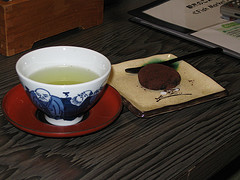There are quite a few sources online regarding green tea and the benefits gained from drinking it regularly. However, there are relatively few sources that outline side effects from drinking green tea. From my own personal research and from years of experience living in countries where green tea and oolong tea is one of the more common beverages consumed, I have concluded that there are few, if any, green tea side effects.
As with any food or beverage there are bound to be some side effects for some people, if moderation is not used. However, the side effects are not strictly related, in this case, to green tea but rather to people’s pre-existing intolerances or other existing medical conditions. In other words, while green tea is a relatively safe beverage to consume there may be some contraindications to drinking it regularly or in too great quantities.

Health Benefits
First, though, let’s take a look at some of the documented benefits of green tea. It has fairly low caffeine levels making it a great drink for people wanting to avoid heavily caffeinated drinks.
All teas, especially green tea and oolong tea, are rich in antioxidants. Green tea has anti-aging benefits, is said to help decrease the risk of certain types of cancer and the antioxidants help to cleanse and rejuvenate the body.
It likewise tends to increase the body’s metabolism which lends itself toward being a great supplement when dieting or simply trying to maintain a specific weight.
The low caffeine levels make it non-addictive, unlike many other highly caffeinated drinks.
When Not To Drink Green Tea
Low Tolerance to Caffeine: I am often asked, “is green tea caffeine free?” In short, no, it is not. Obviously, if you have a fairly high intolerance to caffeine, which many people do, you may want to either avoid drinking green tea or at least steep and discard the first cup of green tea brewed. Regular organic green tea leaves can be used to steep up to three cups of tea before you need to discard the tea leaves and start over with a fresh batch of leaves. The second and third cups of tea will have little to no caffeine. There are also decaffeinated green teas available however the decaffeination process can sometimes use chemicals that are more harmful to the body than a little caffeine would be. Generally, health benefits derived from decaffeinated green tea or oolong tea are likewise diminished due to the additional processing the tea undergoes.
Sensitive Digestive System: Although I disagree that green tea should be singled out as being harmful for people suffering from indigestion or those who have problems with bloating or nausea, it may not be the best choice of drink for those with such problems. However, it goes without saying that people with sensitive digestion should also avoid a myriad of other food and drink–not just green tea. Some people find that oolong tea is easier on the digestion than green tea.
Do Not Drink When Pregnant Or Give to Children: In this instance I would say moderation was of prime importance. The low levels of caffeine should not harm either pregnant women or children. Incidentally, there are much higher levels of caffeine in many carbonated drinks children regularly consume than are found in green tea.
Remember, in some cultures women have been drinking green tea for centuries and have not been harmed at all by doing so. Some may argue that the health benefits of green tea far outweigh the issue of small amounts of caffeine being consumed when drinking green tea.
In Summary: While some people may find that green tea does have some side effects that they would prefer not to experience, most people are able to safely drink and profit from the health benefits found in green tea. Does green tea have caffeine? Yes, but so do many other beverages. Overall, many people consume products on a daily basis that pose a much greater threat to their health and overall well being than a cup or two of green tea would. Personally I feel that the health benefits far outweigh any green tea side effects or green tea extract side effects for most people.